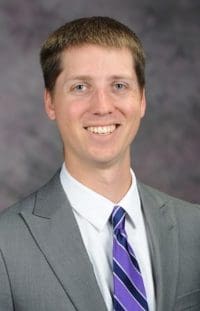Work helps to safeguard water quality in the state
By Pat Melgares, K-State Research and Extension news service
MANHATTAN, Kan. – It’s not likely that Daniel Skucius sees a glass of water as just a glass of water.
He’s more inclined to see it as a flowing Kansas creek that has been protected from pollutants from a nearby field where burly cattle graze the land.
Such is the perspective of a Kansas watershed specialist.
Skucius recently joined a cast of five watershed specialists under the direction of the Kansas Center for Agricultural Resources and the Environment (KCARE), a group that works with Kansas landowners and farmers to adopt and implement best management practices to safeguard water quality in the state.
Skucius will work in northeast Kansas along with long-time K-State watershed specialist Will Boyer. Skucius calls it “boots on the ground” work alongside farmers and other landowners.
“We’ll be working with our partners to address areas in which we can create win-win partnerships with farmers and ranchers that help their operation and also benefit water quality,” Skucius said.
Examples of projects include working with landowners wanting to lengthen grazing periods for cattle; setting up watering systems for cover crops; establishing residual crop feeding fields; or creating alternative water sources for livestock.
“Much of what we do right now is on the livestock side, (such as) keeping animal waste where it’s supposed to be and in a way that benefits everyone,” Skucius said.
He adds that the projects between watershed specialists and farmers “are not pie in the sky ideas. These lead to real, proven results that can help the water that we have flowing through our communities today.”
According to information from KCARE, projects in Kansas watersheds are guided by a planning and management framework known as a Watershed Restoration and Protection Strategy, or WRAPS.
The plan includes identifying restoration and protections needs in a watershed; establishing management goals; creating a cost-effective plan to achieve the goals; and implementing action steps. Landowners participate in the process, rather than plans being mandated by government agencies.
Skucius grew up in Sterling, Kansas and received his degrees in wildlife and outdoor enterprises management from K-State. He worked at the Rock Springs 4-H Ranch as a conservation specialist and as a 4-H agent in Pottawatomie prior to his recent position as a watershed specialist.
More information on the K-State watershed specialist program is available at local K-State Research and Extension offices.













